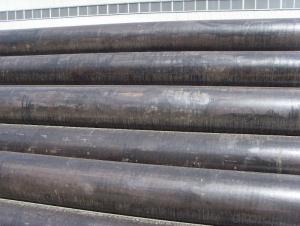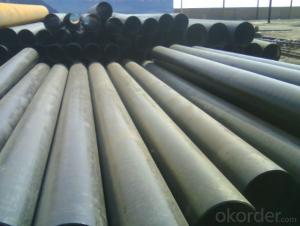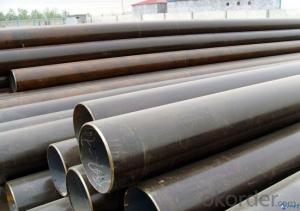Steel pipe for carbon seamless ,Q345, cnbm
- Loading Port:
- Qingdao
- Payment Terms:
- TT OR LC
- Min Order Qty:
- 10 pc
- Supply Capability:
- 30 pc/month
OKorder Service Pledge
OKorder Financial Service
You Might Also Like
Quick Details
Thickness: 6 - 50 mm Section
Shape: Round
Outer Diameter: 33 - 600 mm
Secondary Or Not: Non-secondary
Application: Fluid Pipe
Technique: Hot Rolled,Hot Rolled,Cold Drawn,Hot Expanded Certification: API Surface Treatment: Beveled end or plain end or varnished as per buyer
Special Pipe: API Pipe Alloy Or Not: Non-alloy
Brand Name: XPY(Xinpengyuan)
Length: 6-12m or according to clients' requirements
Standard: BS 3059-2,JIS G3454-2007,GB 5310-1995,GB 3087-1999,GB/T 8163-1999,GB/T 8162-1999,GB 6479-2000,DIN 1629/3,DIN 2448,ASTM A106-2006,ASTM A53-2007,API 5CT,API 5L,BS,JIS,GB,DIN,ASTM,API
Grade: 20#,45#,15CrMo,12Cr1MoV,16Mn,A53(A,B),A106(B,C),API J55,API K55,API N80,API P110,St52,St45,Q235,Q345,10#-45#,Cr-Mo alloy,A53-A369,API J55-API P110,ST35-ST52,Q195-Q345
Packaging Detail: Beveled end , plain end, varnished, or adding plastic caps/ according to customers' request
Bundles or loose, each bundles with 8 steel strips and
nylon slings wrapped with water proof plastic cloth.
We also pack our products according to customer’s requirement
- Q:What are the common methods for repairing steel pipes?
- Depending on the nature and extent of the damage, there are several common methods available for repairing steel pipes. One method frequently used is welding. This technique involves melting the damaged area and fusing it with a new piece of steel. Welding is typically employed for small cracks or holes in the pipe. Different welding techniques, such as shielded metal arc welding (SMAW), gas metal arc welding (GMAW), or tungsten inert gas (TIG) welding, can be utilized. Another option is pipe wrapping or bandaging. This method entails wrapping a layer of adhesive tape or resin-soaked fiberglass around the damaged section of the pipe. It is suitable for addressing small leaks or corrosion spots and serves as a temporary solution until a more permanent fix can be implemented. If the damage is extensive or the pipe suffers severe corrosion, pipe lining or relining may be necessary. This involves inserting a new pipe liner inside the existing one, effectively creating a new pipe within the old one. Various materials, such as epoxy, polyethylene, or cured-in-place pipe (CIPP), can be used for this method. Pipe lining is commonly employed for larger diameter pipes or when replacement is not feasible. In some instances, minor leaks or cracks can be repaired using pipe clamps or sleeves. These devices are designed to be clamped around the damaged section and can provide either a temporary or permanent solution, depending on the severity of the damage. Ultimately, the choice of repair method depends on factors such as the extent of the damage, accessibility of the damaged area, budget constraints, and the required long-term durability. It is advisable to consult with a professional pipe repair specialist to assess the specific situation and determine the most suitable method for repairing steel pipes.
- Q:What type of steel pipe dance is used in general?
- According to international competition practice, the standard size of steel tube is 40 mm or 45 mm in diameter, and the 45mm is usually used. The height of the steel pipe is not less than 3.3 meters and not higher than 4 meters.
- Q:Are steel pipes suitable for semiconductor manufacturing plants?
- Yes, steel pipes are appropriate for use in semiconductor manufacturing plants. Steel pipes are renowned for their durability, strength, and resistance to corrosion, making them an exceptional option for a variety of industrial applications, including semiconductor manufacturing. Within semiconductor manufacturing plants, a range of chemicals and gases are employed throughout the production process. Steel pipes possess a high degree of resistance to corrosion and can endure the harsh chemicals and gases typically encountered in semiconductor manufacturing environments, thereby ensuring the integrity and longevity of the piping system. Moreover, steel pipes are capable of withstanding high-pressure conditions, which are frequently required in semiconductor manufacturing plants. They exhibit excellent mechanical properties and can endure heavy loads and stress, rendering them dependable for the transportation of fluids and gases under high pressure. Another benefit of steel pipes is their adaptability in terms of size and shape. Semiconductor manufacturing plants often necessitate a complex and intricate piping system to accommodate diverse processes and equipment. Steel pipes can be easily customized and fabricated to meet specific requirements, enabling efficient and seamless integration into the infrastructure of the plant. In summary, steel pipes possess the necessary qualities and characteristics for use in semiconductor manufacturing plants. Their durability, resistance to corrosion, high-pressure capabilities, and flexibility make them a suitable choice for the transportation of chemicals and gases in this industry.
- Q:How are steel pipes used in the manufacturing of scaffolding?
- Steel pipes are used in the manufacturing of scaffolding as they provide a sturdy and reliable structure for supporting workers and materials at various heights. These pipes are often used as the main framework, providing the necessary strength and stability required for safe and efficient construction work.
- Q:Which is more load-bearing, the same thickness of steel pipe and steel bar?
- The magnitude of the axial force acting on the steel member is only related to three factors, namely, the strength of the material, the sectional area of A and the longitudinal stability factor of F.
- Q:Can steel pipes be used for structural purposes?
- Yes, steel pipes can be used for structural purposes. They are often used in construction projects to create strong and durable building frameworks, as well as in various engineering applications where load-bearing capacity is required.
- Q:Can steel pipes be used for conveying solids?
- Yes, steel pipes can be used for conveying solids. Steel pipes are commonly used in industries such as mining, construction, and agriculture to transport various solid materials, including ores, gravel, sand, and grains. The durability and strength of steel make it a suitable material for handling solid substances efficiently and ensuring their safe transportation.
- Q:What are the advantages of using steel pipes in construction projects?
- Using steel pipes in construction projects offers numerous benefits. Firstly, the strength and durability of steel pipes are remarkable. With a high tensile strength, they can withstand heavy loads and pressures without any deformation or breakage. This makes them ideal for projects that require structural integrity, such as building construction, bridge building, and infrastructure development. Secondly, steel pipes exhibit exceptional resistance to corrosion. They are typically coated with protective layers, like galvanized zinc or epoxy, which prevent rusting and extend their lifespan. Consequently, steel pipes are suitable for both aboveground and underground applications, including water and sewage systems, oil and gas pipelines, and industrial processing plants. Furthermore, steel pipes offer great versatility in terms of shape and size. They can be manufactured in various diameters and thicknesses, allowing for customization to meet specific project requirements. This flexibility in design makes steel pipes suitable for a wide range of applications in construction, including plumbing, HVAC systems, and structural supports. Moreover, steel pipes are relatively easy to install and maintain. They can be welded, threaded, or bolted together, providing a secure and leak-proof connection. This ease of installation reduces construction time and labor costs. Additionally, steel pipes require minimal maintenance, as they are resistant to cracking, chipping, and warping. This makes them a cost-effective choice over the long term. Lastly, steel pipes are environmentally friendly. They are 100% recyclable, meaning they can be reused and repurposed without compromising their structural integrity. By recycling steel pipes, the demand for new raw materials is reduced, and waste generation is minimized. Therefore, steel pipes are a sustainable option for construction projects. In summary, the advantages of using steel pipes in construction projects encompass their strength, corrosion resistance, versatility, ease of installation and maintenance, and environmental sustainability. These attributes make steel pipes a reliable and cost-effective choice for a wide range of applications in the construction industry.
- Q:What are the different types of steel pipe coatings?
- There are several types of steel pipe coatings, including epoxy coatings, polyethylene coatings, polyurethane coatings, and zinc coatings. These coatings help protect the steel pipes from corrosion, increase their lifespan, and improve their performance in various environments.
- Q:What are the non-destructive testing methods used for steel pipes?
- Some of the non-destructive testing methods used for steel pipes include ultrasonic testing, magnetic particle testing, liquid penetrant testing, radiographic testing, and eddy current testing.
1. Manufacturer Overview |
|
|---|---|
| Location | |
| Year Established | |
| Annual Output Value | |
| Main Markets | |
| Company Certifications | |
2. Manufacturer Certificates |
|
|---|---|
| a) Certification Name | |
| Range | |
| Reference | |
| Validity Period | |
3. Manufacturer Capability |
|
|---|---|
| a)Trade Capacity | |
| Nearest Port | |
| Export Percentage | |
| No.of Employees in Trade Department | |
| Language Spoken: | |
| b)Factory Information | |
| Factory Size: | |
| No. of Production Lines | |
| Contract Manufacturing | |
| Product Price Range | |
Send your message to us
Steel pipe for carbon seamless ,Q345, cnbm
- Loading Port:
- Qingdao
- Payment Terms:
- TT OR LC
- Min Order Qty:
- 10 pc
- Supply Capability:
- 30 pc/month
OKorder Service Pledge
OKorder Financial Service
Similar products
New products
Hot products
Related keywords






























